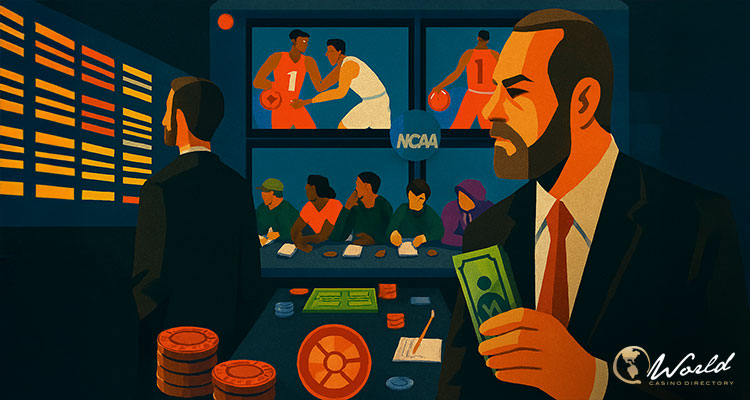A growing investigation by federal authorities and the NCAA is revealing alarming details about a suspected gambling operation that allegedly influenced betting activity on men’s college basketball games last season. Documents obtained by ESPN show that a network of bettors repeatedly wagered large sums against specific small-conference teams in at least 11 games between December 2024 and mid-January 2025.
The records, collected from multiple sportsbooks across the U.S. and Canada, indicate a consistent pattern: gamblers were betting heavily against the same programs — and often winning. According to an email from IC360, a firm that monitors wagering patterns for irregularities, at least nine sportsbooks in 13 states and one Canadian province detected these anomalies. Many of the bets focused on first-half spreads, a market that can be more vulnerable to manipulation.
Suspicious Patterns and a Key Figure
Several bettors caught the attention of sportsbooks after opening new accounts or reactivating dormant ones to make unusually large or consecutive wagers on college basketball’s first halves. In some instances, bettors placed multiple $300 bets or attempted wagers as high as $20,000.
One sportsbook specifically flagged Marves Fairley, a Mississippi man who sells betting picks online, as “the main syndicate suspect.” Fairley, when contacted by ESPN, firmly denied any wrongdoing, stating, “I sell picks.” He added, “Once this thing comes out and we can talk, man, and get all this behind us, whatever is going on, whatever the suspicion may be, just try to figure it out.”
Fairley, who has not been charged, acknowledged knowing Shane Hennen — a co-conspirator in the Jontay Porter betting case — but denied involvement in any college basketball point-shaving activities.
Games Under Scrutiny and Federal Involvement
The suspicious bets coincided with games involving several schools now under NCAA investigation for gambling-related issues, including Eastern Michigan, Temple, New Orleans, North Carolina A&T, and Mississippi Valley State. One of the earliest alerts involved Norfolk State’s game against Stony Brook on December 1, 2024, when multiple new accounts suddenly placed excessive bets on Norfolk State covering the first-half spread. The unusual activity prompted some sportsbooks to suspend betting altogether.
In another case, bettors placed tens of thousands of dollars at Harrah’s Gulf Coast casino on Tulsa and Wright State to cover their respective spreads against Mississippi Valley State and Eastern Michigan. Caesars Entertainment later determined that several of the gamblers knew one another and were potentially connected to the same network. One bettor was later arrested on drug and money-laundering charges and described by authorities as a “prolific and successful” interstate trafficker.
Federal investigators from the U.S. Attorney’s Office for the Eastern District of Pennsylvania are now pursuing the case, and sources told ESPN they expect indictments soon. “The FBI has been interviewing college athletes,” one source familiar with the investigation said, and agents believe they have evidence of attempts to manipulate game outcomes.
Betting Trends Continue into January
The betting anomalies did not stop in December. Records show that similar activity extended into early January 2025, including large wagers placed against North Carolina A&T and Eastern Michigan. At Mississippi casinos, bettors placed several high-value first-half bets against those teams — all of which covered.
Bettors also repeatedly targeted New Orleans in multiple contests, including games against McNeese State, Vanderbilt, and Texas A&M-Corpus Christi. After these events, four New Orleans players were suspended, reportedly over gambling violations. FanDuel and other sportsbooks noted identical betting patterns, often from customers in the same regions, indicating a coordinated effort.
NCAA and IC360 Respond
With the next basketball season approaching, the NCAA has intensified its call for greater oversight. Tim Buckley, the NCAA’s senior vice president for external affairs, said: “Protecting the integrity of the game and preventing student-athletes from making bad decisions is a massive undertaking and requires athlete education, collaboration between sportsbooks, regulators and sports leagues.”
IC360 echoed the sentiment in a statement, emphasizing that the capacity to identify irregular betting is a crucial strength of the regulated market. “Although the underlying suspicious activity is, of course, concerning, we are proud to be a part of a group of invested stakeholders diligently collaborating to combat bad actors in sport,” a spokesperson said. “We’re optimistic these efforts will yield positive results as we approach college basketball season.”
The widening probe has raised broader concerns about how legal sports betting may be exploited and whether these cases represent isolated incidents or signs of a deeper systemic issue. As scrutiny grows, regulators and sportsbooks are pledging tighter cooperation to prevent further breaches of integrity in college athletics.


